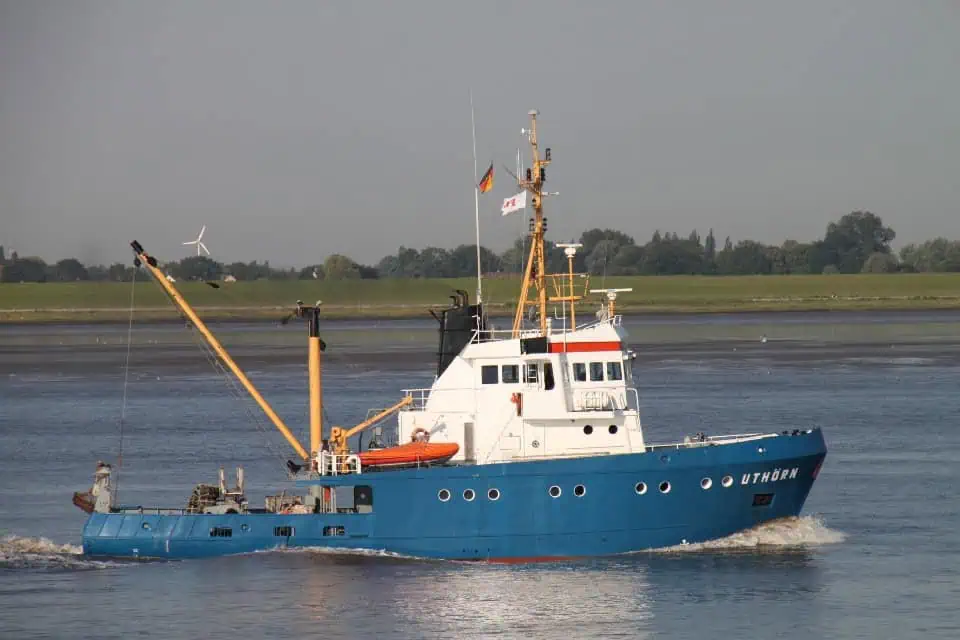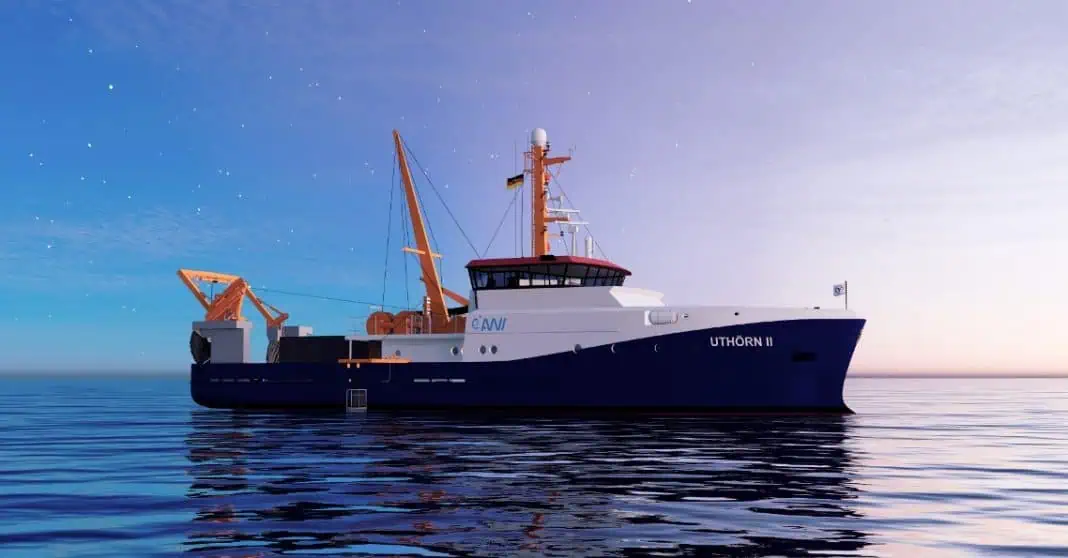Successor to the research ship Uthörn will feature sustainable drive system powered by green methanol
The Alfred Wegener Institute is setting new standards for sustainability in German maritime shipping. On 8 June 2021 the keel for the successor to the research cutter Uthörn will be laid at the Fassmer Shipyard in Berne, Lower Saxony. The 35-metre-long cutter will be the first seagoing vessel in Germany equipped with an environmentally friendly and especially low-emission methanol-fuelled drive system.
Many researchers have learned the tools of their trade on ships like the Uthörn. Built in 1982, the 30-metre-long research cutter, operated by the Alfred Wegener Institute, Helmholtz Centre for Polar and Marine Research (AWI), regularly sails to the North Sea with Marine Sciences students on board. On these cruises, they learn how to safely use heavy research equipment. But the Uthörn – named after a small neighbour of the North Sea island Sylt – is much more than ‘just’ a training ship: as a central pillar of coastal oceanography at the AWI, she regularly assesses the physical, chemical and biological status of the North Sea in the vicinity of the AWI’s Helgoland facilities, gathering valuable long-term data in the process.
Now the Uthörn has finally reached the end of her service life and will soon make way for her successor, which will set new standards in German maritime shipping. The new Uthörn is currently under construction at the Fassmer Shipyard in Berne, Lower Saxony, and her handover to the AWI is slated for October 2022. The Federal Ministry of Education and Research (BMBF) has provided 14.45 million euros of funding for the new coastal research ship. At a length of 35 metres, it will be able to accommodate a five-person crew and four researchers for up to five days at sea, covering up to 1,200 nautical miles. For day cruises, the Uthörn will be able to accommodate up to 25 students and instructors.
In addition, the ship’s technical equipment will be cutting edge: the new research cutter will feature not only an extensive working deck with dry and wet labs, but also two derrick booms for trawling nets and water samplers, a multi-frequency fish echo sounder for finding and identifying swarms of fish, and an anti-roll tank to help keep it stable on choppy seas. But the real gem is how the ship is powered: the new Uthörn will be the first seagoing vessel in Germany equipped with an environmentally friendly and especially low-emission methanol-fuelled drive system.
“I’m happy to say that, with regard to the Uthörn’s successor, we’ve chosen a climate-friendly and environmentally friendly approach for the power supply,” says Prof Antje Boetius. “The greatest benefit is the option of using ‘green’ methanol. Once the methanol’s production is combined with renewable energies, the ship can be operated on a virtually CO2-neutral basis. In addition, methanol dissolves well in water; bacteria break it down almost immediately, which means that, in the event of an accident, it doesn’t pose any major threat to the environment,” the AWI Director explains. Marius Hirsekorn, Logistical Coordinator for the AWI’s research ships, and Dr Michael Klages, who is coordinating the project from a research perspective, cite further advantages: “When methyl alcohol is burnt, substantially fewer soot particles are released into the air than with gasoline, diesel or heavy fuel oil. That being said, the fuel’s energy density, which is only half that of diesel, does pose a challenge. Accordingly, the new Uthörn will be fitted with much larger fuel tanks, ensuring she can bunker enough methanol to maintain a considerable range.”

In maritime shipping, methanol is still a new and comparatively untried fuel. Nevertheless, there have been a number of successful role models: in a prototype project, the Swedish Maritime Administration equipped a pilot boat with a diesel motor refitted for methanol and has reported good performance. The power class of said methanol motor is roughly equivalent to the combined power of the two that will be installed in the new Uthörn. She will employ two modified diesel motors with a combined maximum output of 600 kW, used to run two electric motors for propulsion. These methanol-fuelled motors are currently being developed by the company ScandiNAOS especially for this project.
So that, after the handover in 2022, the new ship can also be operated CO2-neutrally from the outset, a supply contract for green methanol is to be concluded. In the medium term, it may also be possible to produce the fuel on site in Bremerhaven: just three kilometres from AWI headquarters, a major hydrogen competence centre is now being established. In a pilot project, the regenerative electricity generated by an 8-Megawatt wind turbine is to be used to separate water into hydrogen and oxygen using electrolysis. In a subsequent step, this ‘green’ hydrogen and the CO2 from a nearby sewage treatment plant could be used to synthesise ‘green’ methanol that, when burnt, only released the amount of CO2 that was bound during its production.
Bremerhaven could then become one of the first harbour sites in the world to offer both sustainably produced hydrogen and sustainable methanol fuel for German and international shipping. In this regard the Uthörn, as Germany’s first methanol-fuelled seagoing vessel, represents an important practical example – for the Fassmer Shipyard, too. If the AWI’s new training ship proves to be a success, in the long term maritime shipping could become significantly greener, making a meaningful contribution to climate protection.
Video
Source:-












